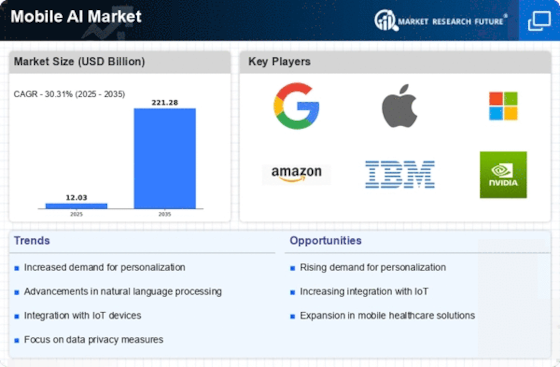Top Industry Leaders in the Mobile AI Market

Competitive Landscape of the Mobile AI Market:
The mobile AI market is experiencing explosive growth, driven by the convergence of powerful hardware, sophisticated algorithms, and an ever-expanding range of applications. This dynamic landscape boasts a diverse range of players, each vying for a piece of the pie. Let's delve into the key players, their strategies, and the factors influencing market share analysis.
Key Players:
- Apple
- NVIDIA
- Huawei
- Samsung Electronics
- Amazon
- Qualcomm
- Intel Corporation
- IBM Corporation
- Microsoft Corporation
- MediaTek
- Graphcore
Strategies for Market Domination:
- Ecosystem Play:Building strong ecosystems with hardware, software, and services integration is key. Apple's tight integration of iOS, A-series chips, and Siri is a prime example.
- Openness and Collaboration:Open-source platforms and collaborations with other companies are fostering innovation and attracting developers. Google's TensorFlow and Microsoft's Azure Cognitive Services are examples of this approach.
- Vertical Specialization:Focusing on specific applications like healthcare, finance, or retail with tailored AI solutions can create a competitive edge. Startups like Babylon Health (healthcare) and Kensho (finance) are examples.
- Privacy and Security Focus:As AI becomes more pervasive, addressing user concerns about privacy and security is crucial. Apple's focus on on-device AI and data privacy is a differentiator.
Market Share Analysis: Beyond Numbers:
- Device Penetration:The number of devices equipped with AI capabilities plays a significant role. Android's wider market share compared to iOS, for instance, gives it an edge in terms of device penetration.
- App Adoption:The adoption rate of AI-powered apps across various categories is crucial. Google Assistant's integration in various third-party apps, for example, gives it an edge over Siri.
- Developer Engagement:Attracting and retaining developers with robust tools and APIs is essential. Google's TensorFlow and Apple's Core ML frameworks are examples of efforts to attract developers.
- User Engagement:Ultimately, user engagement and satisfaction with AI features determine market success. Apple's Siri and Google Assistant's natural language capabilities and accuracy are key factors in their success.
New Entrants and Emerging Trends:
- Edge Computing:Processing data at the device level, rather than relying on the cloud, is gaining traction. Companies like ARM and Nvidia are developing AI-optimized edge computing solutions for mobile devices.
- Federated Learning:This technique allows for collaborative AI training on devices without sharing individual user data, addressing privacy concerns. Google's Federated Learning API is a notable development in this area.
- Explainable AI:Making AI decisions transparent and understandable to users is becoming increasingly important. Companies like IBM are focusing on explainable AI solutions for mobile applications.
Investment Trends: Betting on the Future:
- Venture Capital:AI startups are attracting significant venture capital funding, with companies like DeepMind and Samsong AI receiving multi-billion dollar investments.
- Corporate M&A:Major tech companies are actively acquiring AI startups to bolster their capabilities. Google's acquisition of DeepMind and Apple's acquisition of AI companies like Turi and Voysis are examples of this trend.
- Government Initiatives:Governments are investing in AI research and development, creating opportunities for startups and established players alike. The US DARPA's Systematizing On-Device Learning program is one such initiative.
Latest Company Updates:
Dec 22, 2023: Google AI announces LaMDA 3, a new language model specifically designed for mobile devices, promising faster response times and improved accuracy.
Dec 27, 2023: Apple releases iOS 17 beta with enhanced on-device AI capabilities for image and speech recognition.
Jan 3, 2024: Samsung unveils its new Galaxy X series phones with an AI-powered camera that automatically adjusts settings for optimal photos.
Jan 5, 2024: Facebook launches a new AI-powered newsfeed that personalizes content based on user preferences and interests.










